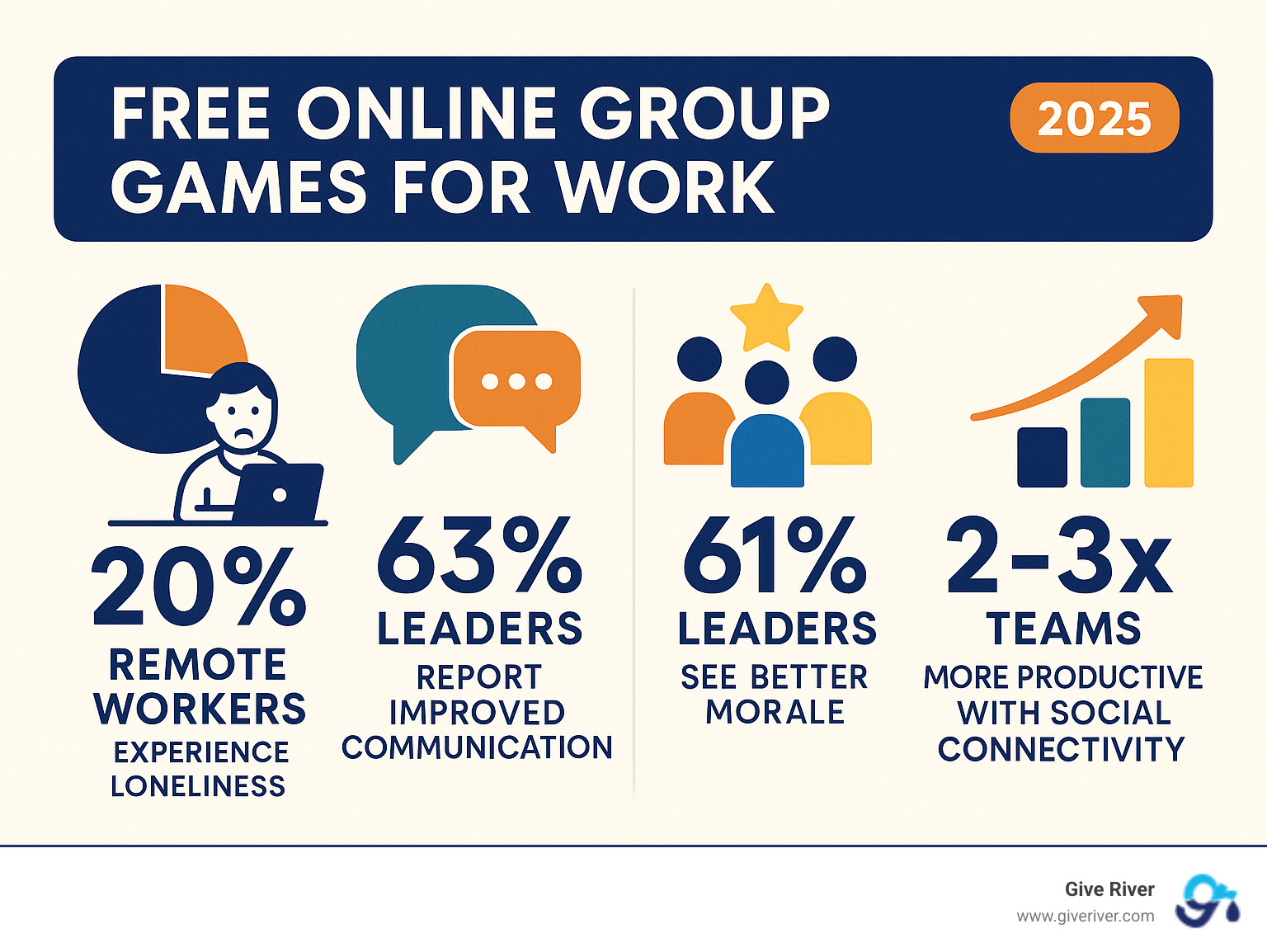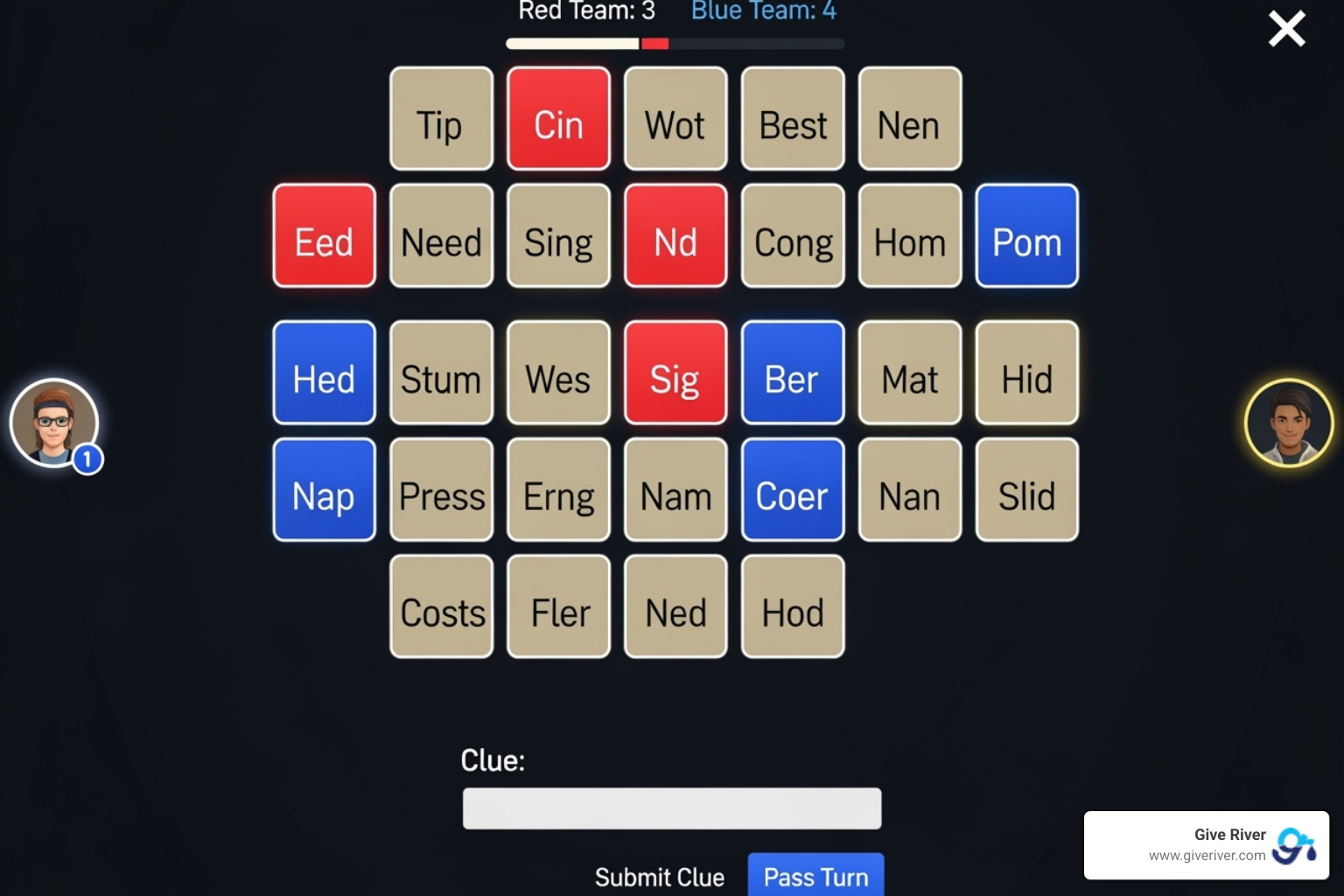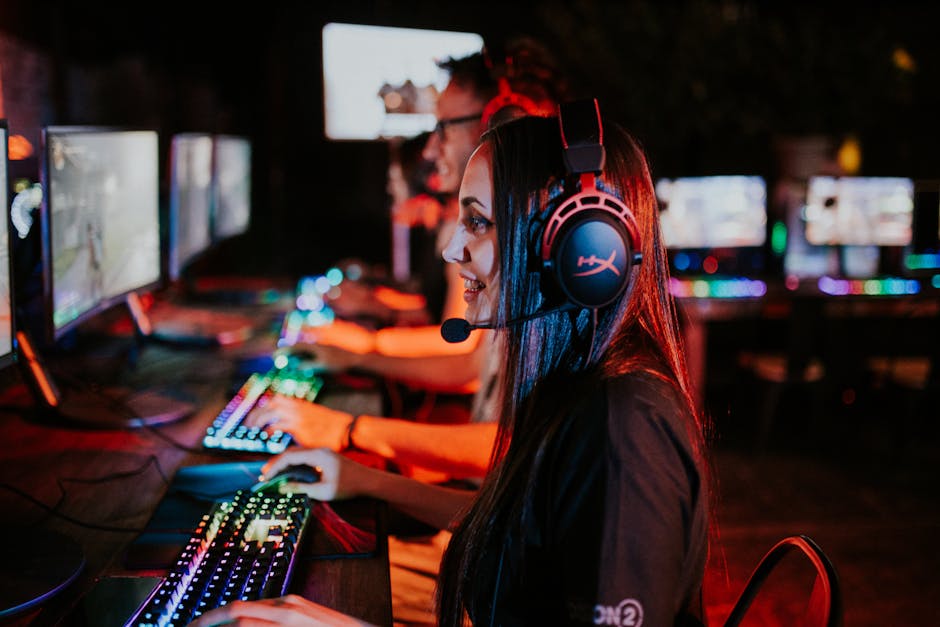Beyond the Boardroom: Fun & Free Online Games for Your Remote Team
Boost remote team morale & connection! Discover fun, free online group games for work to fight Zoom fatigue & build strong bonds.

Why Remote Teams Need More Than Just Meetings
Free online group games for work have become essential tools for building stronger, more connected remote teams. Here are the top categories of games that can transform your team dynamics:
Quick Icebreakers (5-15 minutes):
- Two Truths and a Lie
- Virtual Bingo
- Never Have I Ever (work-safe edition)
Collaborative Games (15-30 minutes):
- Codenames Online
- Gartic Phone
- Skribbl.io
Strategic Challenges (30-45 minutes):
- Virtual Escape Rooms
- WikiRace
- Online Trivia
The shift to remote work has created unexpected challenges that go far beyond technology and productivity metrics. Twenty percent of remote workers struggle with loneliness, and this isolation directly impacts team performance. Meanwhile, research shows that 63% of leaders report improved team communication and 61% see better team morale after participating in team-building activities.
The problem isn't just about missing the water cooler conversations or spontaneous brainstorming sessions. Remote teams often experience what experts call "Zoom fatigue" - the mental exhaustion that comes from back-to-back video meetings with little opportunity for genuine human connection. When your team members are scattered across different time zones, working from home offices or kitchen tables, building authentic relationships becomes both more challenging and more critical.
Social connectivity makes employees two to three times more likely to maintain or increase their productivity in remote environments. Yet many organizations struggle to create these connections without resorting to awkward "mandatory fun" that feels forced rather than genuine.
As Meghan Calhoun, I've spent over two decades creating meaningful connections in high-pressure work environments, from television hosting to sales roles that required building instant rapport with people during their most vulnerable moments. My experience has taught me that free online group games for work aren't just entertainment - they're strategic tools for building the psychological safety and trust that high-performing teams need to thrive.

The Ultimate List of Free Online Group Games for Work

When you're looking at that 20% of remote workers struggling with loneliness, it becomes clear that the right kind of play isn't just entertainment—it's essential workplace medicine. These free online group games for work serve as powerful antidotes to isolation, building the rapport and trust that scattered teams desperately need.
The beauty of web-based games lies in their simplicity. No downloads, no IT department headaches, no compatibility issues across different devices. Your team members can join from their browser in seconds, whether they're working from a high-powered desktop or their partner's old laptop. This accessibility means the difference between actually playing together and spending twenty minutes troubleshooting why someone can't install the latest team-building app.
What makes these games truly special is how they level the playing field. The shy analyst who rarely speaks up in meetings might become the star of a drawing game, while your most competitive sales manager learns to laugh at their terrible artistic skills. It's not about winning—it's about those moments of genuine laughter that create the psychological safety every high-performing team needs.
For more comprehensive strategies on leveraging digital experiences for your team, explore our guide on Digital Games for Team Building.
Quick Icebreakers & Warm-ups (5-15 Minutes)
Those first few minutes of any virtual meeting can feel awkward, with everyone staring at their own reflection while waiting for someone else to break the silence. The right icebreaker transforms that energy completely, turning a room full of muted cameras into an engaged team ready to collaborate.
Two Truths and a Lie remains a classic because it works. When your usually reserved developer reveals they once performed stand-up comedy, or your project manager admits to having met three celebrities in one day, you're not just learning facts—you're seeing colleagues as full human beings. The game creates those "I had no idea!" moments that stick long after the meeting ends.
Never Have I Ever gets a professional makeover when you focus on work-safe experiences that everyone can relate to. "Never have I ever fallen asleep during a video call" or "Never have I ever forgotten to mute myself" creates instant camaraderie through shared embarrassment. The goal isn't elimination—it's connection through our beautifully human imperfections.
Virtual Bingo turns networking into a game. Create cards filled with squares like "has worked from a coffee shop," "speaks three languages," or "has a pet that's interrupted a meeting." As team members mark off squares that apply to their colleagues, they're actively seeking connections and commonalities. It's relationship-building disguised as friendly competition.
Quick Draw brings out everyone's inner artist (or lack thereof). Using any shared whiteboard feature, one person draws while others guess in the chat. The worse the drawing, the better the laughs. There's something magical about watching your serious finance director attempt to sketch "quarterly projections" while the team throws out increasingly wild guesses.
For additional inspiration, check out our resources on Fun Ice Breaker Questions for Virtual Meetings and Remote Working Icebreaker Games.
Collaborative & Creative Free Online Group Games for Work

Moving beyond quick warm-ups, collaborative games create the kind of shared experiences that transform a collection of remote workers into a genuine team. These free online group games for work focus on working together rather than against each other, building trust through creativity and cooperation.
Codenames reveals how differently our minds work—and that's exactly why it's perfect for teams. When your marketing manager gives the clue "fluffy, 2" and expects teammates to choose "cloud" and "pillow," but they pick "cat" and "marshmallow" instead, you're witnessing the beautiful complexity of human thought. These moments of misalignment become inside jokes, while successful connections feel like mind-reading magic. You can play for free at sites like horsepaste.com.
Gartic Phone takes the childhood game of telephone and adds visual chaos. One person writes "team meeting," the next draws their interpretation, then someone describes that drawing, and so on. By the final reveal, "team meeting" might have become "angry robots having coffee." The hilarious changes create belly laughs and demonstrate how easily communication can go wonderfully wrong.
Skribbl.io levels the artistic playing field beautifully. Whether you're Picasso or can barely draw a stick figure, everyone's equally challenged to communicate through doodles. The pressure to guess quickly keeps energy high, while the chat fills with increasingly creative (and desperate) guesses. No artistic talent required—enthusiasm is enough.
Weavr brings out team personality through prompts and voting. Teams respond to questions with text or GIFs, then vote on favorites. Over several rounds, you start seeing patterns in humor, preferences, and thinking styles. It's like a personality test disguised as entertainment, helping teammates understand what makes each other tick.
These games foster creativity and teamwork over competition, creating positive shared memories that teams carry into their actual work. For more ways to build collaborative experiences, explore our Digital Team Building Activities.
Strategic & Problem-Solving Challenges (15-45 Minutes)
Sometimes teams need a real challenge to find what they can accomplish together. Strategic games push beyond small talk into the field of collaborative problem-solving, where success depends on clear communication, active listening, and collective intelligence.
Free Virtual Escape Rooms put teams under gentle pressure to solve puzzles and uncover clues within a time limit. The magic happens when quiet team members suddenly become key contributors, offering insights that open up the next challenge. These experiences reveal hidden strengths and create genuine "we did it!" moments that boost team confidence. Many libraries and enthusiasts create free versions that rival expensive commercial options.
WikiRace seems deceptively simple until you're three clicks deep, trying to steer from "Coffee" to "Albert Einstein" using only Wikipedia links. Teams can work together or compete, but either way, you'll find fascinating connections between seemingly unrelated topics. The game rewards both logical thinking and creative leaps, often leading to "how did we end up here?" moments that become legendary team stories.
Spreadsheet Battleship transforms the mundane into the strategic. Using Google Sheets or Excel, teams set up their ships and take turns calling out coordinates to sink their opponents' fleet. It's familiar enough that everyone understands the rules instantly, yet requires genuine strategic thinking about positioning and probability. Plus, it's surprisingly effective stealth training for spreadsheet skills.
These strategic challenges encourage critical thinking and collaborative problem-solving, giving teams practice working together under pressure in a low-stakes environment. The skills they develop—clear communication, logical reasoning, and collective decision-making—translate directly to workplace challenges.
For teams ready for more intensive virtual challenges, explore our guides on Virtual Team Challenge Games and Quick Virtual Agile Games.
How to Effectively Facilitate Free Online Group Games for Work
The difference between free online group games for work that energize your team and those that fall flat often comes down to one thing: how well they're facilitated. I've learned from years of hosting everything from live television shows to high-stakes sales meetings that creating genuine connection requires intentional leadership, not just good games.
Your role as a facilitator goes far beyond just picking a fun activity. You're the one who sets the emotional temperature of the room, creates psychological safety, and helps everyone feel welcome to participate. This starts before the game even begins - frame the session as a chance to take a breather from work stress and connect as humans, not as another item on the meeting agenda.
When introducing any game, clarity is your best friend. Explain the rules simply, offer a quick demonstration if needed, and most importantly, make participation feel genuinely optional. Nothing kills the fun faster than someone feeling forced to play along. I always tell teams, "This is about connection, not competition - and if you'd rather just watch and cheer others on, that's perfectly fine too."
Not everyone on your team identifies as a "gamer," and that's exactly why these activities work so well. The beauty of collaborative games like Codenames or Gartic Phone is that they don't require gaming skills - they require the same communication and creative thinking your team uses every day at work. When someone says they're "not good at games," I remind them that the person who can't draw a stick figure often gets the biggest laughs in Skribbl.io.
Adapting games for your specific team needs makes all the difference. For shy teams, start with anonymous guessing games rather than spotlight moments. Large teams benefit from breakout rooms that create smaller, more intimate spaces. Always consider the technical side too - stick with web-based games that work on basic laptops and don't require downloads, because nothing derails fun like technical difficulties.
Your existing platforms are goldmines for creative gameplay. Zoom's breakout rooms turn any team challenge into smaller collaborative sessions. The chat function becomes a rapid-fire guessing tool. Slack channels can host ongoing photo challenges - like "Guess Whose Pet" or "Find the Weirdest Thing in Your Home Office." These familiar tools remove barriers and make games feel like natural extensions of how your team already communicates.
The secret ingredient is psychological safety. When people feel comfortable being silly, making mistakes, and showing their personalities, that's when real connection happens. Scientific research on psychological safety shows that teams perform better when members feel safe to take interpersonal risks - and laughing together over a terrible drawing definitely counts as an interpersonal risk worth taking.
You're not just facilitating a game - you're creating space for your team to see each other as whole people, not just job titles in video call squares. For more detailed strategies on creating these meaningful moments, explore our guide on Team Building Activities for Online Meetings.
Beyond the Game: Building a Culture of Connection

While free online group games for work are incredibly effective tools for team connection, they represent just the beginning of what's possible when we commit to building a truly connected workplace culture. Think of these games as the spark that ignites something much more powerful – a workplace where people genuinely care about each other's success and well-being.
The impact of regular team-building activities extends far beyond the laughter shared during a game of Gartic Phone or the "aha!" moments in virtual escape rooms. When we create consistent opportunities for authentic connection, we're directly addressing that 20% of remote workers who struggle with loneliness. More importantly, we're changing the entire team dynamic from one of isolated individual contributors to a cohesive unit that supports each other through challenges and celebrates wins together.
Reducing burnout becomes a natural byproduct when team members feel genuinely connected to their colleagues. Instead of dreading another Zoom meeting, they look forward to seeing familiar faces and sharing experiences. Strengthening relationships through play creates the psychological safety that high-performing teams need to innovate, take calculated risks, and communicate openly about both successes and setbacks.
The business case is compelling, but the human impact is what truly matters. When teams regularly engage in activities that prioritize connection and fun, they develop the resilience to handle workplace stress more effectively and the trust to collaborate at deeper levels.
Of course, many organizations turn to platforms like Bonusly or Kudos to address team connection through recognition programs. While these tools excel at peer-to-peer recognition, they often miss the deeper opportunity to create a holistic culture of connection and purpose.
This is where Give River's approach becomes transformative. Our unique 5G Method recognizes that true team building isn't just about recognition or rewards – it's about creating an integrated experience that combines gamification, gratitude, and generosity into daily work life. We've designed what we call a "game of good deeds," where team members don't just play together for an hour; they actively contribute to each other's growth and to their community's well-being throughout their work experience.
The magic happens when team building becomes woven into the fabric of how your organization operates. Instead of scheduling monthly team activities as separate events, we help create environments where connection, recognition, and purpose-driven action happen naturally as part of the work itself. Teams that accept this holistic approach don't just have better meeting dynamics – they develop the kind of authentic relationships that drive innovation, retention, and genuine job satisfaction.
Ready to move beyond occasional games to a comprehensive culture of connection? Find how Give River's team-building solutions can transform your workplace at More info about team-building solutions.




